TCM Principles for Weight Loss
In TCM, no matter what therapeutic approach is applied, there are always guidelines behind it. These basic principles are derived from different diagnostic theories, such as the eight principles or organs (zang fu) theory. According to the TCM understanding of obesity, the underlying principles for weight loss treatment are:
1. Harmonize the stomach to promote fat digestion
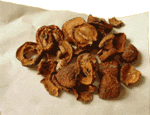 |
| Hawthorn helps promote digestion. |
A majority of obese people consume an excess amount of greasy foods such as sweet cakes and fried meats. The stomach will have trouble digesting these foods, and thus they will be detained in it. Symptoms such as distention in the gastric and abdominal areas, backward flow of stomach contents into the mouth, foul breath and a greasy coating on the tongue may be present. Herbs like hawthorn, malt and radish (seed) can be used to promote the secretion of digestive fluids and help the digestion of fatty materials in the stomach.
2. Activate the blood to remove the stasis
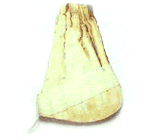 |
| Chinese angelica helps promote blood flow. |
High levels of lipids (fats) in the blood that lead to sclerosis of blood vessels are regarded as a phenomenon of blood stasis in TCM. Methods of activating the blood flow and removing blood stasis not only promote the blood flow, they can also help to lower the lipid content in the blood and decelerate the sclerosis process. Herbs most commonly used in this way are Chinese angelica, Szechuan lovage, red sage root, red peony root and notoginseng.
3. Relieve chest stuffiness to eliminate phlegm
 |
| Trichosanthes (gua lou) helps the lungs get rid of phlegm evils. |
From a TCM viewpoint, fatty tissue is a kind of turbid phlegm. The excessive phlegm associated with obesity leads to shortness of breath during exercise, chest oppression and dizziness. In more severe conditions, when both phlegm and heat evils accumulate, individuals will present with an impulsive, easily provoked temper, high blood pressure, a distending headache and insomnia. A yellow and greasy fur usually covers the tongue. Herbs like trichosanthes (gua lou), Chinese chive bulbs, peel of various citrus fruit, mandarin orange peel and trifolicate orange enhance the lungs to disseminate and liquefy the phlegm evils.
4. Remove the stagnation of the liver and gall bladder
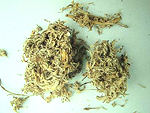 |
| Capillary Artemisia (yin chen) helps with proper functioning of the liver and breakdown of fats. |
The liver plays an important role in qi (vital energy) circulation, as well as the enhancement of food digestion and blood flow. The gall bladder secretes bile and aids in the digestive process. Proper functioning of the liver and the gall bladder assists the break down of fat. Herbs most commonly used to assist this process include capillary Artemisia (yin chen), zedoary rhizome(e zhu), turmeric (jiang huang) and cassia seed (jue ming zi). This type of treatment is effective for individuals who suffer from a fatty liver and gall stones.
5. Induce diuresis (excretion of urine) and eliminate dampness
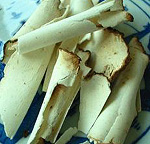 |
| Indian bread (fu ling) helps induce diuresis. |
Obesity involves the disorder of fluid metabolism. When there is dysfunction of distribution or excretion of body fluids, symptoms can present such as swollen eyelids, edema (retention of fluid in the tissues), obesity or other conditions. Inducing diuresis (excretion of urine) is a direct way to promote the elimination of excessive dampness. Herbs most commonly used in this way are wax gourd, water-plantain (ze xie), Indian bread and plantain seed.
6. Induce purgation by promoting bowel movements
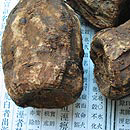 |
| Rhubarb (da huang) is commonly used to promote regular bowel movements. |
An obese body gathers too much turbid waste and fatty tissues. The large intestine is usually under-functioning and constipation can also add to the problem. Promoting regular bowel movements reinforce excretion and eliminate body wastes. Herbs commonly used to promote regular bowel movements are rhubarb, bushy knotweed (hu zhang) and fleeceflower root (shou wu).
The above principles aim to expel excessive evils contributing to obesity. Several principles are usually combined in real practice. However, if individuals are under-functioning in the spleen and kidneys, then tonifying treatments should be considered. They help to build up the qi (vital energy) inside the body as well as facilitate expelling evils. |